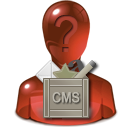Because you have content to manage. That's the simple answer, and it actually makes a lot of sense. But there's a little more to it, of course. The reasons extend beyond managing content, and managing content isn't always a good reason to build your site on a CMS. Confusing? Let's look look at the pros and cons.
A CMS makes sense when
- You are developing a content-rich website for a client. Typically, your client will have more knowledge about their product than you do, so it only make sense to have them create and input the content. But, that's not the only reason. Giving your client the ability to directly affect the content of their own website makes them far more interested in their site. A client interested in their own website is more apt to make additional feature requests. I like to call it "They do the coding, you do the programming", where coding refers to the HTML code produced by the graphical editor you put in place for them.
- For a larger client, this improves turnaround time on minor content changes.
- For a smaller client, this is a money-saving technique that will allow them to spend more money on the project upfront.
- For a larger client, this improves turnaround time on minor content changes.
- You are developing a content-rich website for yourself. You can write HTML code in a plain-text editor, with your eyes closed, one hand behind your back while sleeping at your desk. Does does that mean you enjoy doing it? If you're like me, you'd rather being adding interactive applications to your site than wrapping content in paragraph tags. A CMS can save even a programmer a good deal of time. You're using an interface designed specifically for creating new HTML pages. Few IDEs can top that.
- Managing media is less painful. What's worse than having to create a large, preview, thumbnail and listing version for a new product graphic? Punching yourself in the eye, maybe. There's not a CMS out there that won't automatically create the various image scales you need upon upload of the source image. Not to mention automated photo galleries, slide shows, carousels, etc. Beyond images, managing downloadable files such as PDFs and Word Documents becomes easier as well.
A CMS does not make sense when
- Performance is critical. Any CMS has baggage. That baggage comes in the form of database connections, initialization, loading library functions, permissions checking and http connections to load assets that may or may not even be used. Unless you are willing to spend a great deal of time to "trim down" your CMS of choice, sticking to a more simplified framework is wiser approach when there are performance concerns.
- Security is critical. Every CMS has it's vulnerabilities. Popular CMSes are more likely to be exploited by a malicious hacker. Unless you keep on the bleeding edge of vulnerability discoveries, you're at risk.
- You like one of their pretty themes. With any CMS comes pluggable themes, a site-design in a box, ready to become the new face of your website with just one click. Sounds enticing! It is, but it should not be the reason you choose a particular CMS, or even the deciding factor for using a CMS at all.
Make the decision to go with a CMS or not. If you decide in favor of a CMS, decide on your platform based on your server's capabilities, the admin interface, level of maintenance, support, etc. Once you make your choice, find a theme that's close to heaven, then make any necessary tweaks to it.
- You don't have any content. If you're site is more of an application, or only has a few pages, a CMS is overkill, yet another layer to maintain.
If you're looking for some help deciding on a CMS, check out my related article, A review of CMS and E-Commerce platforms.
